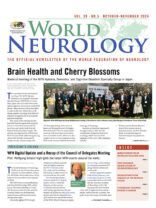Prof. Wolfgang Grisold highlights the latest WFN events around the world.
By Prof. Wolfgang Grisold, FAAN
The World Federation of Neurology (WFN) now has 125 members, as we welcome our latest addition, Ghana. The WHO has 194 member states, which leaves 69 more members to become part of WFN.
The WFN owns several publications, including World Neurology (WN), which has an estimated readership of 25,000. WN focuses on news from the scientific societies, updates on developments, regional issues, and historical content, among other topics.
Our newly applied WFN Google Analytics reveal that countries with the highest interest in the WFN website are the U.S., India, and Great Britain, followed by a stable number of countries all over the world .
We recently launched an initiative called WFN Digital Update (WNU), which has helped us reach countries worldwide with educational and training opportunities. We also remind our readers our official journals, the Journal of the Neurological Sciences (JNS) and the eNS, serve in the interest of the WFN. The JNS features a regular Service Page, which will add to communications from WN along with the website and social media.
Another important initiative is the Global Advocacy and Leadership Program (GALP), a joint effort between the WFN and the American Academy of Neurology (AAN). We had great interest in the first event, with 94 applicants from 44 low/middle- and low-income countries. The goal is to provide young and middle-aged neurologists with the tools they need to advocate for patients in neurology and to be leaders in neurology. This policy of advocacy and leadership is especially important in countries where neurology is developing. Insights regarding leadership negotiations help the progress of neurology in those countries.
Advocacy is also one of the strategic tasks of the WHO International Global Action Plan (IGAP), which increases awareness of the growing need for advocacy around the world. The GALP course will begin in person at the AAN Annual Meeting April 5-9 in San Diego, and will have several virtual updates culminating in a second face-to-face meeting at the World Congress of Neurology (WCN) in Seoul, which will include a public graduation.
Our other virtual activities, such as the educational days, have proved successful. We anticipate a new educational day with the Asian and Oceanian Association of Neurology (AOAN) in February on movement disorders, and another educational day with Africa next year on neuroimmunology. For this year, we look forward to the International Headache Society-Global Patient Advocacy Coalition Headache Day that will be on Nov. 23.
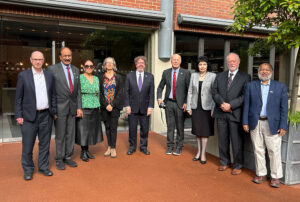
Trustees at their London meeting in September 2024.
Council of Delegates
At the recent Council of Delegates (COD) meeting, we confirmed the results of the elections and carried motions for changes to our bylaws. On Sept. 24 and 25, the WFN`s elected and co-opted trustees held a face-to-face meeting in the London office. They also met with the participants in the WFN COD on Sept. 25, as a virtual meeting.
For the COD, 72 people participated and 58 member societies attended.The president, officers, and several committee chairs reported on WFN proceedings. There were four motions that were accepted:
- Approval of the Auditors’ Report for 2023.
- Reappointment of Griffin Stone Moscrop & Co. as auditors.
- Change of the WFN bylaws to have a president-elect and a past-president in the future.
- Acceptance of Ghana as the 125th member of the WFN.
As many societies have done already, the WFN will have the position of a president-elect, and the immediate past-president will remain on the board for one year following his or her term in office. This is necessary to preserve continuity, which is important for many of the long-term tasks of the WFN.
Future WFN presidents should have previously held office either as a trustee or acted as chair of a WFN committee for at least one year to gain insight and establish a profile within the organization. In the future, conflicts of interest need to be transparent for all officers and trustees. In particular, the WFN president must not hold an executive position in another scientific society.
The vote for the first president-elect will be in three years, and the first past-president will be the newly elected president who takes office in 2025.
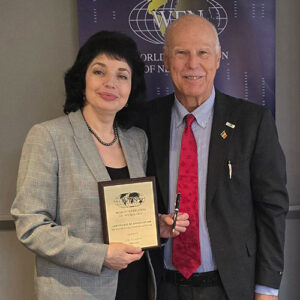
Prof. Alla Guekht receiving a WFN plaque for her services as a trustee.
For this COD meeting, elections were held for the position of one trustee, replacing Prof. Alla Guekht, whose second term ended. Votes were received electronically from 52 member societies for a new trustee. Prof. Tissa Wijeratne, who was nominated by the Association of Sri Lankan Neurologists, was elected. He has been engaged in many WFN activities for many years, in particular World Brain Day. I want to thank all of the applicants for their efforts in running for this important position.
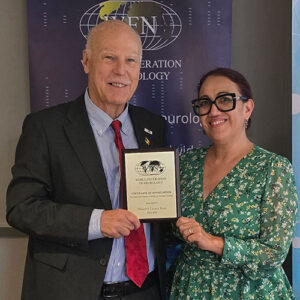
Prof. Minerva Lopez Ruiz receiving a plaque for her service as co-opted trustee representing Latin America.
Following the COD meeting, the president and the trustees thanked Prof. Guekht for her relentless devotion to the WFN. The co-opted trustees Prof. Maria Benabdeljlil and Prof. Minerva Lopez Ruiz were also recognized. All were awarded with a WFN plaque.
For the 2025 election, the positions of president, vice president, and one elected trustee (Prof. Chandrashekhar Meshram — re-electable once) will be up for election. The call for candidates will be made next year. We expect many suitable applicants who will engage to bring the WFN forward and increase the presence and importance of neurology.
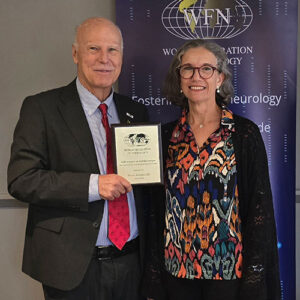
Maria Benabdeljlil receiving the Plaque for her outstanding services as a co-opted trustee, representing the Arab and African region.
Following the COD meeting, the first WNU took place. The WNU 2024 was a virtual 2-day meeting moderated by Profs. Steven Lewis, Riadh Gouider, and Wolfgang Grisold live from the London office. We welcomed speakers from many societies and had excellent faculty and talks. The meeting was accredited by the European Accreditation Council for Continuing Medical Education with 9 CME points. Participants came from 60 countries.
This was the first virtual interim meeting of the WFN, and the aim was to fill the gap between the biennial WCN with necessary and timely updates. Many speakers have agreed to submit a summary of their lectures to the journal, which will be a source of information and is accessible as an Open Access journal.
The main pillars of the WFN are education and global activities. Please see our latest updates on education on the WFN Essentials page.
In 11 years, we have established four Training Centers in Africa. From these, we have three four-year training positions in Africa and several one-year fellowship opportunities for epilepsy, general neurology, neuromuscular disease, and stroke. For the last call, we had 165 applicants for a 4-year training position in Cape Town.
We are aware that the WFN Training Centers cannot fill the gap in Africa. However, the WFN Training Centers help to crystallize education, and increasingly other universities have started neurology training programs.
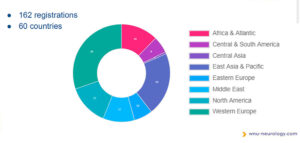
Countries participating in the WNU.
We are open to suggestions and are aware that there is a strong tendency for subspecialization in Africa. WFN Training Centers are selected based on their capabilities to provide excellent inpatient and outpatient services and are connected with a network of other medical and surgical fields to provide excellent training. We already have a large number of alumni and are encouraged by the success of our trainees. We are indebted to the Association of British Neurologists (ABN) for sharing our costs in Cairo, and to the constant support of the International Congress on Neuromuscular Diseases for one training position in neuromuscular disease in Rabat.
Empower the Regions
In addition to the careful selection of Training Centers, regular communication and updates are necessary. We plan to visit all the African WFN Training Centers in 2024 as well as the Latin American center in Mexico City. This year, we have already visited Cairo and Dakar and were impressed by the spirit and activities of those Training Centers. Moreover, we had the opportunity to speak with trainees and the local staff.
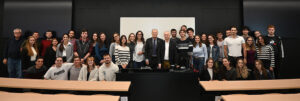
Prof. Bruno Giometto and Prof. Wolfgang Grisold opening the neuroscience program in Trento, Italy.
We are planning to visit Rabat and Cape Town this year and will be reporting on those visits and impressions soon in the JNS service pages. These will be formal site visits, speaking with trainers and trainees and looking at the opportunities and results of the past years. The visitation committee will consist of the co-chair of the Education Committee along with WFN Secretary General Prof. Steven Lewis and myself as the president of the WFN.
During our discussions with member societies, the idea was presented that young neurologists from high-income countries should be given the opportunity to spend time in low-income countries to learn from them and contribute their own knowledge on a local and regional level. We will develop this as a project with a small committee.
Young neurologists are heavily involved in some WFN committees, in particular in education, where the core curriculum is advancing. We seek further possibilities to extend this, but we know that it must be implemented on a solid foundation and will take time.
Education should start among students, and the WFN is grateful for the cooperation of the International Federation of Medical Students. An interesting initiative is a neuroscience training course for medical students, which was created by Prof. Bruno Giometto at the University of Trento in Trento, Italy. A detailed report will be published in the WFN Service Pages.
World Brain Day 2025 will focus on brain health, in combination with a subtopic, which is still being discussed. We believe brain health is a powerful summary of activities in neurology. For example, several countries in Europe have incorporated the concept of brain health into their national health policies. This could be a template for many parts of the world to deal with the issues of brain health, equity and access, healthy lifestyle, and implementation of sustainable development goals (SDGs). It may be an important step in the future and help all member societies to promote neurology.
Global Activities
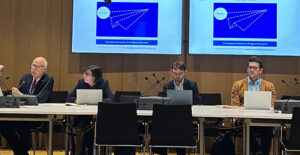
WHO meeting on mental health in Geneva. Prof. Grisold speaking on the implementation of the IGAP.
Our global activities with the WHO continue to focus on promoting the IGAP, the Brain Health initiative — Defeating Meningitis by 2030, and promoting the use and implementation of the WHO Essential Medicines List (EML) globally. The WHO and U.N. sections of our website contain lists of WFN-WHO and WFN-Economic and Social Council (ECOSOC) activities from 2023 and 2024. The work with the WHO and the U.N. ECOSOC takes a lot of responsibility and time. We thank Prof. Guekht, our past trustee, and Ksenia Pochigewa, our WFN intern, as well as the London office for making this possible.
Our most recent WHO activity was our participation at the WHO Mental Health Forum 2024 on Oct. 9-10, in Geneva, Switzerland.
Mental health is closely connected with neurology. The designation of the WHO unit, Mental Health, Brain Health, and Substance Use, emphasizes this close relationship. The WFN had two interventions at this meeting: one on the cooperation between the WFN and the WHO, and another to promote IGAP. Many interactions with multiple stakeholders took place and reaffirm the presence and activity of the WFN in promoting neurology on a global stage.
2025 will be an important year for the WFN in regard to elections and leadership, the WCN in Seoul, educational activities such as the recently launched GALP projects, and plenty of other projects within the organization.
Please continue to follow us on our website and in our newsletter and journals. •
